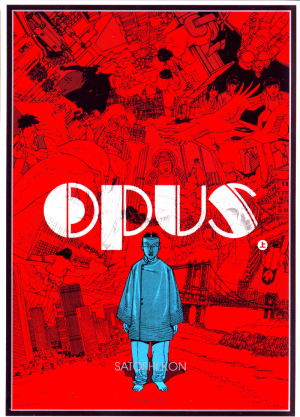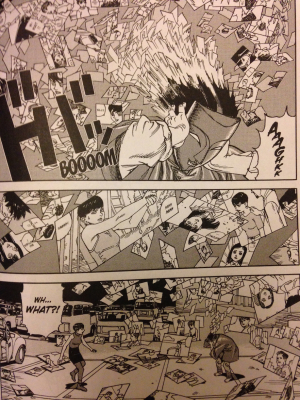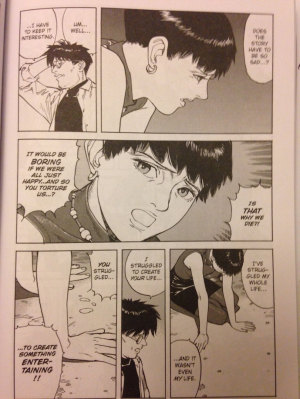Mind in the Gutters – Satoshi Kon’s Opus
“Mind in the Gutters” is a space for D. Bethel to discuss specific comics without any particular relevance or connection to Long John itself. The first discussion is the incomplete manga, Opus, by late celebrated animation director, Satoshi Kon.
It’s not a lie that much of Satoshi Kon’s manga, Opus (published stateside by Dark Horse Comics in November 2014), is basically an action-adventure version of 2006’s Stranger Than Fiction, a drama-comedy directed by Marc Forster and starring Will Farrell as an unknowing protagonist of a novel written by a novelist, played by Emma Thompson, in the “real world.” The major plot point of the film comes when the protagonist and the novelist actually meet and they both realize that they have either much less or more power, respectively, over their lives than previously known, and they are both horrified.
Kon’s Opus follows a similar meta-trajectory with the meeting happening much earlier and the fallout of such a meeting being much more catastrophic, manic, and ultimately absurd. The presence and similarity of Opus to Stranger Than Fiction naturally throws suspicion upon the former; however, when one realizes that Opus was the final long-form manga of Kon’s before he dove headfirst into directing animated works, and was originally published starting in 1995, suspicion is quickly turned on its head. Comparing the two works is not the goal, here. Rather, it is the examination of meta-textual works (specifically those where fictional character and possibly-fictional creator meet) and, despite how often they can be confusing head-trips (though not as confusing or confounding as intricate time-travel, I would argue), their apparent world-breaking nature actually belies a limited array of storytelling options. This is only confirmed by placing these two works––published in different decades, in different countries with different cultures––next to each other.
What Opus basically boils down to is a bouncing back and forth between the fictional world and “reality” (the latter becomes rather complicated in the final, unfinished chapter); in the fictional world, it’s full of peril and fantasy; in the “real” world, it’s a situational comedy not unlike watching something like Bewitched where the creator doesn’t want everyone to find out his fictional hero is “alive” in the “real” world, all while being plagued by the deadlines of his editors to finish his comic. What drives the whole story is guilt––confronting the question that drives most creatives to create, “What if these characters were real people in these situations?”, and asks them to really follow that line of thinking through. How much responsibility does a creator have to her characters? Ostensibly, the metatextual questions of Opus are examining the medium in which its characters are aware of being a part––comics; more widely, however, I would argue pretty much every metatextual story that has the creator meet the created becomes a convoluted narrative about storytelling in general. Which is great. However, I feel it really does prescribe a plot in order to keep it from becoming simply generic science fiction or fantasy.
The unpolished writer would avoid such larger questions (or ask them early on and then ignore the answers), and it would kind of become a standard “man out of time/place” story, A Yankee in King Arthur’s Court/John Carter of Mars/Mary Sue kind of situation when the character from “reality” simply becomes another character in the fiction. Instead, throughout Opus, characters keep asking the creator variations on the question, “Why would you do this to us?” What’s interesting is that the answers to these impassioned questions are incredibly impersonal, because a lot of story decisions are made for the sake of the craft rather than the character, thus hinting that the age-old idea that writers––who are usually considered to be rather empathic because they can place themselves in the shoes of people who don’t exist––are actually psychopathic with regard to their characters.
This is powerfully illustrated in Opus in a scene in which the “fictional” hero asks her creator of her story, “Does [my] story have to be so sad?”
The creator blanches and sweats and smiles, replying, “Well…I have to keep it interesting.”
The hero falls to the floor. “I’ve struggled my whole life and it wasn’t even my life.”
“I struggled to create your life,” her creator responds.
“You struggled to create something entertaining!”
Such is the struggle of every creative working with plot and characters, and often what separates the scared writers from the productive ones. If fiction asks of its writers to love their characters and then throw rocks at them, meta-fiction (of this nature) asks writers to realize the fallout to throwing rocks at the characters they love––that the characters aren’t only being challenged, but are being harmed in the process. We’re in the business of making broken people.
This leads me to wonder, why is Opus asking this question? Why try to scare writers off from making things tragic, sad, and––for lack of a better term––interesting?
It is the answer to this question where I think Opus generally succeeds on a closer inspection. Such profundity is well-hidden behind gorgeous set pieces and riveting action (many, many pages of action), but I think the manga’s ultimate statement is not that we should care more for our characters, but that we suffer right along with them. As much as we worry about deadlines (those both arbitrary and real), creators are as much a part of the story as their characters. More than that, creators are as much trapped in their medium as their characters, and––as illustrated in the final, unfinished chapter––the further one tries to excavate the divide between fiction and reality, the more layers you find or, perhaps, you create.
This leads to the fundamental problem of a story like Opus; the further out you weave toward reality, the truth is that you can never truly represent real reality in a comic form. It’s a problem or paradox worthy of Zeno. One can approximate and one can be honest or accurate, but whether it’s through skillful drawing or even the use of video or photographs, the full meta-crisis only exists in the text, thus keeping it as a fun diversion for a creator rather than the ethical dilemma such a scenario is portrayed as being in the work.
Satoshi Kon’s Opus is fun and is never really difficult to follow; but as a manga that is trying to say something I found it affective more in afterthought than in the moment. Kon’s art is polished and his page and panel composition are inventive which makes it clear why he was also such a good fit for animation. What’s interesting, however, is that the story he was trying to tell in Opus is a story that could only be told as a comic; to make an animated version or live-action version of it would either flatten the entire premise or, to avoid that, you would have to fundamentally rework the premise (change the creator to an animation director rather than a comicker, for instance).
Opus is a comic about comics and, to that end, I’m glad it exists even in the “unfinished” form that it is. I would argue, however, that to pursue a comic like this would have pushed it to a realm that would have been either untenable or plain cheesy (again, as hinted in the final, unfinished chapter) and I would like to believe that Kon knew this as well and realized that its unfinished state is probably the best way to end his story.
Podcast: Play in new window | Download




Discussion ¬